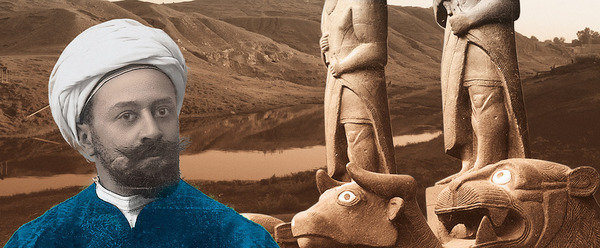An Oriental Adventure
dal 29/4/2014 al 9/8/2014
Segnalato da
29/4/2014
An Oriental Adventure
Bundeskunsthalle der Bundesrepublik Deutschland, Bonn
The exhibition traces Max von Oppenheim's eventful biography and his lifelong love for the East which found expression in each and every one of the lavish oriental costumes and accessories he amassed in his private collection.

In 1899 the diplomat and archaeological explorer Baron Max von Oppenheim
(1860–1946), a scion of the Cologne banking family, discovered the residence of
an Aramaean ruler of the early first millennium BC at Tell Halaf in modern-day
Syria. The find was an archaeological sensation of the first order. Oppenheim
had found the ruins of the Old-Testament city of Gozan (Guzana). The celebrated
Western Palace was embellished with monumental stone sculptures and
fantastical stone reliefs. A tomb yielded over-life-size funerary figures and
valuable funerary goods.
From Cologne to Cairo – Max von Oppenheim as Attaché, Orientalist and
Archaeologist
The exhibition traces Max von Oppenheim’s eventful biography and his lifelong
love for the East which found expression in each and every one of the lavish
oriental costumes and accessories he amassed in his private collection. Having
studied law in Germany, Max von Oppenheim was drawn to Cairo, where he
learned Arabic and immersed himself in the pleasures of an Oriental lifestyle.
A relatively undistinguished diplomat, Oppenheim was catapulted into the
limelight of German Near and Middle Eastern archaeology by his discovery of
the Tell Halaf in 1899 – a time when renowned German archaeologists were
excavating Babylon and Assur. During the First World War Oppenheim’s
familiarity with the region became a strategic asset, and he – like T.E. Lawrence
(Lawrence of Arabia) on the British side – was drawn into the thick of the
political conflict.
The Tell Halaf Museum in Berlin, its Destruction in 1943 and the Restoration of
the Finds between 2001 and 2010
In 1929 Max von Oppenheim brought numerous Tell Halaf finds to Berlin, where
he opened his own museum in 1930. Among the illustrious visitors who signed
the visitors’ book were Samuel Beckett, Agatha Christie, Emil Nolde and Max
Beckmann. The Tell Halaf finds – destroyed during a night-time bombing raid on
Berlin in 1943 and painstakingly restored some sixty years later – tell the story of
a 3000-year-old civilisation, but they have also become a poignant reminder of
Germany’s recent history.
Tell Halaf – An Aramaean City in the Shadow of the Assyrian Empire
The central section of the exhibition brings to life the long-lost world of the
Aramaeans and presents the unique archaeological finds from Tell Halaf which
testify to the wealth of the Aramaean city state in modern-day Syria. Visitors will
be able to see the recreation of the famous monumental entrance façade of the
Western Palace with the original sculptures. This is complemented by a virtual
reconstruction of the entire city of Guzana (modern Tell Halaf, Old Testament
Gozan). Today, a replica of von Oppenheim’s iconic façade reconstruction of the
1930s frames the main entrance to the National Museum of Aleppo in Syria. The
Tell Halaf finds and other important objects of Syria’s cultural heritage displayed
there are once again threatened with destruction.
The principal lender to the exhibition, the Max von Oppenheim Foundation, set
up by Oppenheim himself in 1929, is supporting the exhibition with the loan of
some 450 objects preserved at the Rautenstrauch Joest Museum in Cologne and
the Vorderasiatisches Museum in Berlin. Both institutions have in the past
presented major exhibitions on Max von Oppenheim: Faszination Orient 2001 in
Cologne and Die geretteten Götter aus dem Palast vom Tell Halaf in 2011 in Berlin. The
exhibition in Bonn brings together Max von Oppenheim’s exquisite collection of
Oriental objects from Cologne and the impressive Tell Halaf archaeological finds
from Berlin in a comprehensive survey show that is complemented by
outstanding loans from the Louvre and the British Museum.
Curator Ulrike Dubiel
Head of Corporate Communications / Press Officer
Sven Bergmann
T +49 228 9171–204
F +49 228 9171–211
bergmann@bundeskunsthalle.de
Bundeskunsthalle der Bundesrepublik Deutschland
Friedrich-Ebert-Allee 4 - 53113 Bonn
Opening Hours Tuesday and Wednesday: 10 a.m. to 9 p.m.
Thursday to Sunday: 10 a.m. to 7 p.m.
Public Holidays: 10 a.m. to 7 p.m.
Closed on Mondays
Admission
standard / reduced / family ticket € 10 / € 6.50 / € 16
Happy Hour-Ticket €6
Tuesday and Wednesday: 7 to 9 p.m.
Thursday to Sunday: 5 to 7 p.m.
(for individuals only)
Advance Ticket Sales
standard / reduced / family ticket € 11.90 / € 7.90 / € 19.90
Admission for all exhibitions
standard / reduced / family ticket € 15 / € 10 / € 24
Audio Guide for adults € 4 / reduced € 3
in German language only
Guided Tours in different languages English, Dutch, French and other languages on request



